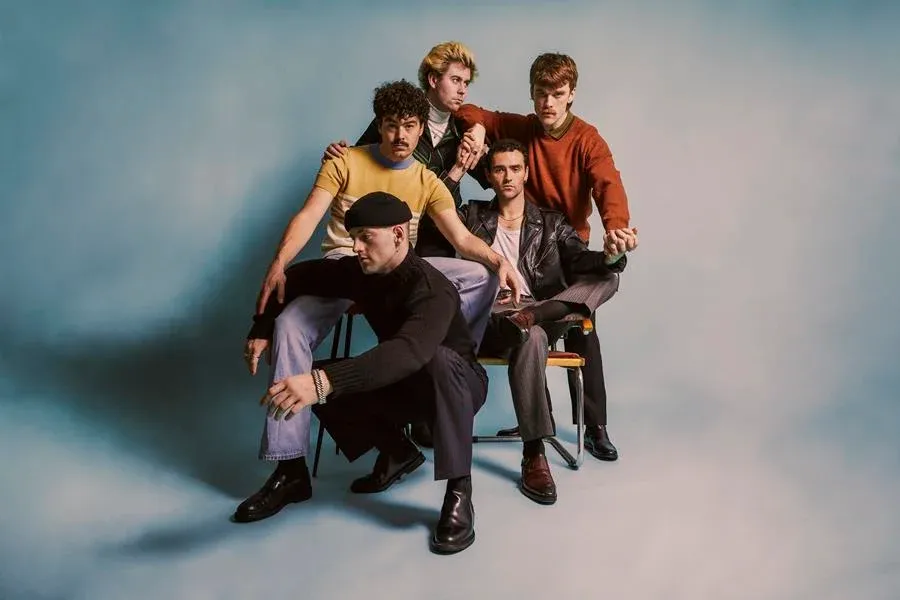The Murder Capital: A State of Mind
Interviews
After their first attempt to tour the U.S. was cut short in 2020 due to the pandemic, The Murder Capital has returned. The Dublin-based rock band—consisting of singer James McGovern, guitarist Damien Tuit, guitarist Cathal Roper, bassist Gabriel Paschal Blake and drummer Diarmuid Brennan—came onto the scene in 2019 with their critically acclaimed debut, When I Have Fears. They have been described as an “abrasive yet cerebral” blend and sit sonically between the likes of IDLES and fellow Dubliners Fontaines D.C. They will hit several cities throughout the country, including Salt Lake City, to promote their new album, Gigi’s Recovery. SLUG got the chance to sit down with Brennan over Zoom to discuss the new album, what makes the Dublin music scene so great and how their album concepts are more like states of mind.
SLUG: Does the Dublin music scene seem as awesome to you as it does to the rest of the world? It seems like all the best rock bands are coming out of Dublin, from bands like Gilla Band to you guys and Fontaines D.C. What’s your perspective on the music scene there?
Brennan: I think it’s great. No [band] is chasing a particular thing in Dublin. Everyone is doing their own thing, and people seem to be catching onto it now […] I think being authentic is the main thing. That’s the impressive part. It’s lads that don’t sound like anyone else. It’s bands that don’t sound like anyone else.
SLUG: I know you guys have referred to Gigi’s Recovery as a concept album. Do you consider your first album, When I Have Fears, to be a concept album as well?
Brennan: Yeah, I think the two albums are abstract concepts. It’s more like a state of mind—that’s the concept. The first album is kind of about grief and where you go with grief. There’s kind of an abrasive attitude to that first album. [But] then, Gigi’s Recovery is more about the introspection afterward. If the first album is about loss, the second one is about acceptance […] dealing with your past.
SLUG: You guys have talked about how the band had more disagreements making this album than the first. How did you guys get past all that?
Brennan: We were all pulling in different directions, especially when going down the world of experimenting with different textures and different sonic landscapes. We were trying to kind of get lost in a lot of that […] and that can be a recipe for friction. I was talking to a friend about it and he’s just like, “You’re just being a band. Like, you guys wrote the first album so fast. And now these discussions and you guys taking your time and maybe not moving as fast as you want—it’s just you being a band.”
Within that, you really solidify the relationships within the band, like myself and Gabe. We talk about how much closer we’ve gotten, how we understand each other’s humor a lot more. We can really pull positive emotions out of each other at times when we might be feeling down or negative. It goes back to the band being a friendship and a brotherhood.
SLUG: Was it hard to finalize songs on the albums after two years of working on them?
Brennan: Songs like “Gigi’s Recovery,” “A Thousand Lives” or “Crying,” we had those songs pretty much together from the start. But we went through this long process of being okay with them and then not okay with them—going in circles around these ideas until, you know, we reach to a point we need to be confident in what they are.
SLUG: Were there any changes on any songs that surprised you while recording the album?
Brennan: Yeah, there were a couple of big shifts. We demoed the shit out of these songs. But working with [producer John Congleton], he’s the guy that says like, “I listened to them once. I don’t want to, like, upset you, but you guys know these songs so intimately and my job is to be objective.” So with that, we were able to have discussions that were fresher.
For “The Lie Becomes The Self,” there was always a moment in the demo that I felt wasn’t the way it should be. I remember there was this bit in the middle, we were trying a more abrasive thing, and it just never felt right. We were talking about that in the studio and John was like, “You can bring the dynamic right down for the whole thing.” And that just made so much sense, because that was one thing we hadn’t really tried from the very beginning. And then Cathal recorded the piano part on a grand piano that was in the studio which completely changed the song and it just became what it was always meant to be.
Gigi’s Recovery is out now and available on streaming platforms everywhere. Be sure to catch The Murder Capital on their U.S. tour when they come to Kilby Court in SLC on April 8.
